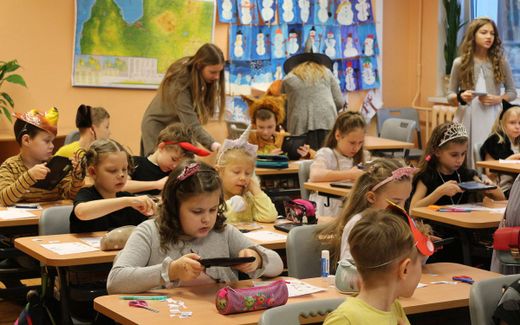Why we need a Christian view of man in education
20-08-2024
Opinion
Christian Baldauf, CNE.news

A student holds a mask in front of her face in her classroom at the Petri primary school in Dortmund, western Germany. Photo AFP, Ina Fassbender
Opinion
At the beginning of a new academic year, all schools focus again on maths, language, arts, and physical education. However, what makes Christian schools unique is their vision on humanity which then should also have effects on subject teaching. This starting perspective influences all parts of the curriculum, says Christian Baldauf, head of the German VEBS Academy.
As teachers in Germany, we are used to dealing with subject-specific science, didactics and methodology. We have often studied different subjects such as physics, mathematics, biology, art and languages and teach them on a day-to-day basis. In the practical situations of a challenging school life, it is always about good ideas for lessons, usable materials and copy templates.
Even though we work with people every day, thinking about what actually defines a person, what the characteristics of each person are, is not a matter that is thought about much. If we explicitly deal with images of human beings, with our own (often unconscious) image of human beings, this may only be the content of a teacher training course; if this subject area is even part of the training at all!
Reflecting on your own image of humanity is not simply a possible content of philosophical and educational science discourses. Instead, it is becoming aware of how one's view of humanity affects our pedagogical actions and objectives in concrete ways.
For example, if I assume that humans are beings who have the ability to form relationships and are dependent on them, I may place particular emphasis on promoting encounters between people and communication processes in the classroom. If I (also) regard people as having different interests and talents, I will consider tailored measures to be fundamentally necessary and pay attention to different learning opportunities, etc.
Consensus
When reflecting on the underlying image of man, the question arises as to where the statements about man come from. Are they personal opinions, a consensus among colleagues or even the results of scientific studies?
I am writing this as a Christian; as a person who believes in Jesus Christ, the Son of God. I do this on the basis of the Bible as the written and true Word of God – from A to Z. And I want to make it transparent: In this perspective, statements about people, about what makes up every person, cannot be made without the One Who created man. It is God Himself.
This means that I am no longer operating solely on the horizontal level ("What do people think and say about people?"), but rather allow God to have His say with the request that He reveals his view of us humans. This vertical orientation is not an addition to the human perspective, but must be the starting point of pedagogy at a Christian educational institution.
It may sound like a truism, but in my view the relevance for educational processes is enormous. When we as Christians work with people in education, we need clarity about God's perspective on people, about every person. With all that could be said about this, I would like to focus on three aspects:
(1) Human beings are created by God in His image as male and female (e.g. Genesis 1:26-27; Genesis 9:6; Psalm 95:6; Psalm 139:13-16; Mark 10:6-8).
(2) Man is deformed by sin (e.g. Genesis 3:8-10; Genesis 8:21; Psalm 51:7; Luke 1:79; Matthew 15:18-20).
(3) Man is loved in Christ (e.g. Matthew 5:45b; Luke 1:76-79, John 3:16; Romans 5:8; 1 John 4:9-10).
What practical consequences can these statements have as starting points for the educational context?
Regarding God's creative action (1), it can mean, for example:
➢ to discover the unique characteristics of a person as a creature;
➢ to explore the indications of the Creator God's actions and to (re)learn to marvel at them;
➢ to understand and accept the gift of being male or female and to communicate this transparently and lovingly in sexual education concepts;
➢ to take into account the dignity of every human being as a consequence of being created in the image of God in communication situations.
Regarding man's need for redemption (2)
➢ the effects of the fall of man on the relationship to God, to fellow human beings, to the Environment, nature and to oneself can be analysed;
➢ we promote thinking and talking openly about the transience of our current body and about dying;
➢ the necessity of rules for human coexistence can be worked out.
In relation to God's love for humanity (3)
➢ God's sustaining measures for life on this earth can be developed (cycles in nature, the coordination in our solar system, the human immune system, etc.);
➢ the history of God's salvation can be unfolded on the basis of His Word;
➢ the birth, life, death and resurrection of Jesus Christ can be illuminated as historical facts, including their significance for mankind.
Opportunity
These three aspects are of great importance at Christian educational institutions, because at the heart of the matter is the position of Jesus Christ in the overall context. Through Him all things were created (Colossians 1:15-17), He is promised as Saviour immediately after the fall of man (Genesis 3:15) and HE is the personified love of God (1 John 4:9-10).
Educational action at a Christian school on the basis of the biblically founded image of man is thus both a mission and an opportunity to keep Jesus Christ at the centre or to place Him at the centre of our consideration (again): "Therefore, we are ambassadors for Christ, God making his appeal through us. We implore you on behalf of Christ, be reconciled to God." (2 Corinthians 5:20).
Dependent
Faith in Jesus Christ opens up the following perspective, which expresses a new identity: The person who believes in Jesus Christ is redeemed and renewed by Jesus Christ (e.g. Isaiah 53:5 and 11; Luke 1:74-75, Acts 26:18; 2 Corinthians 5:17)
Irrespective of our ability to form relationships, to communicate, to shape and apply individual talents, man cannot bring about a change of state before God on his own. Man is dependent on God's action in order not to remain at the level of individual changes in behaviour, but to be able to act as a new creature in Christ.
What a message in the midst of the turmoil and hardships of this time: we can live and communicate in an inviting way. Inviting to a clarified and intimate relationship with the holy God through one person – Jesus Christ. May He, the centre of history, also be and remain the centre of Christian education.
Related Articles









